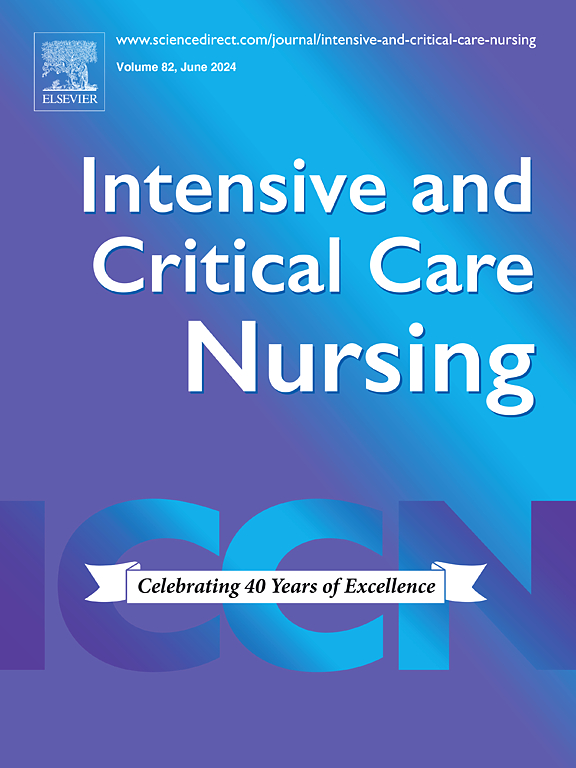多学科医疗专业人员对成人重症监护病房家庭参与的态度
IF 4.9
2区 医学
Q1 NURSING
引用次数: 0
摘要
目的重症监护病房(ICU)的家庭参与是医疗保健服务的一个重要方面,但它仍然是一个不一致的做法,并且是ICU成人患者医疗保健的一个未充分研究的领域。本研究旨在探讨成人ICU医护人员(如注册护士、医师、药师、呼吸治疗师、社工及营养师)对家庭参与的态度,并探讨影响这些态度的因素。方法采用描述性横断面分析,探讨90名医护人员对成人ICU患者家庭参与的态度。采用家庭护理重要性-护士态度问卷(FINC-NA)收集数据。采用描述性统计和多元线性回归对数据进行分析。主要结果测量:ICU医护人员对家庭参与的态度因专业角色的不同而不同,且与工作年限有关。结果显示,医生在总态度量表上对家庭参与的积极态度得分最高,家庭作为一种资源。对护理实践的启示了解医护人员的态度是开发循证干预措施的关键一步,这些干预措施可以促进ICU成年患者的家庭参与。在ICU中培养与患者家属的伙伴关系文化至关重要,但需要采取干预措施来提高护士和其他医疗保健专业人员对家庭参与的态度。支持护士和其他家庭护理提供者的专业培训、资源和制度政策对于促进对家庭参与的积极态度至关重要。需要集体努力,通过实施基于证据的政策和指导方针,改变家庭参与的文化和做法。该研究的发现提供了重要的见解,可能塑造和改善医疗保健实践,特别是在ICU。本文章由计算机程序翻译,如有差异,请以英文原文为准。
Multidisciplinary healthcare Professionals’ attitudes towards family engagement in the adult intensive care unit
Objectives
Family engagement in the intensive care unit (ICU) is a crucial aspect of healthcare delivery, yet it remains an inconsistent practice and an understudied area of healthcare for adult patients in the ICU. This study aimed to explore the attitudes of healthcare professionals (e.g., registered nurses (RNs), physicians, pharmacists, respiratory therapists, social workers, and dietitians) on family engagement in the adult ICU and to elucidate factors that impact these attitudes.
Methods
We used descriptive cross-sectional analysis to explore the attitudes of a sample of 90 healthcare professionals toward family engagement in the ICU for adult patients. Data were collected using the Families’ Importance in Nursing Care-Nurses’ Attitudes (FINC-NA) questionnaire. The data were analyzed using descriptive statistics and multiple linear regression.
Main Outcome Measures
Healthcare professionals’ attitudes towards family engagement in the ICU varied across different professional roles and were associated with years of experience. Results demonstrated that physicians had the highest positive attitude score towards family engagement on the total attitude scale and the family as a resource.
Implications to Nursing Practice
Understanding the attitudes of healthcare professionals is a crucial step toward developing evidence-based interventions that can facilitate family engagement in care for adult patients in the ICU. Cultivating a partnership culture with patients’ families in the ICU is crucial, but interventions are needed to enhance nurses’ and other healthcare professionals’ attitudes toward family engagement. Specialized training, resources, and institutional policies supporting nurses and other providers in family care are essential to promote positive attitudes toward family engagement. A collective effort is required to change the culture and practice of family engagement by implementing evidence-based policies and guidelines. The study’s findings provided significant insights that may shape and improve healthcare practice, particularly in the ICU.
求助全文
通过发布文献求助,成功后即可免费获取论文全文。
去求助
来源期刊

Intensive and Critical Care Nursing
NURSING-
CiteScore
6.30
自引率
15.10%
发文量
144
审稿时长
57 days
期刊介绍:
The aims of Intensive and Critical Care Nursing are to promote excellence of care of critically ill patients by specialist nurses and their professional colleagues; to provide an international and interdisciplinary forum for the publication, dissemination and exchange of research findings, experience and ideas; to develop and enhance the knowledge, skills, attitudes and creative thinking essential to good critical care nursing practice. The journal publishes reviews, updates and feature articles in addition to original papers and significant preliminary communications. Articles may deal with any part of practice including relevant clinical, research, educational, psychological and technological aspects.
 求助内容:
求助内容: 应助结果提醒方式:
应助结果提醒方式:


